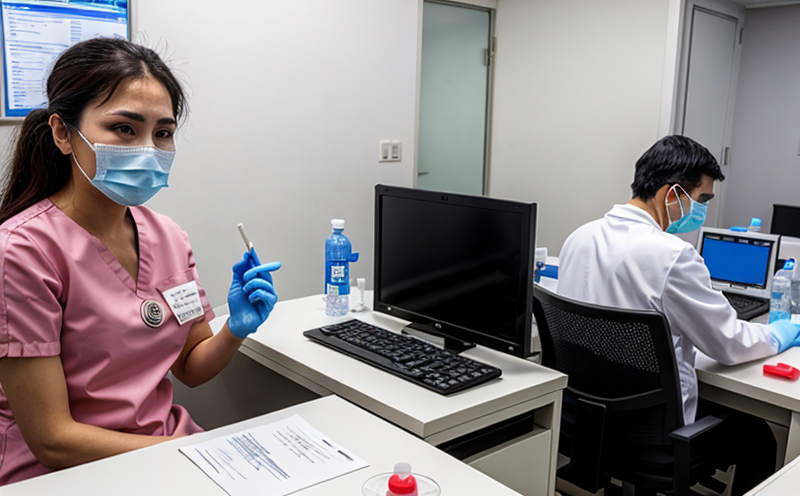Canine Adenovirus Testing in Veterinary Clinics
In veterinary medicine, the identification and diagnosis of infectious diseases are critical to patient care and public health. Canine adenoviruses (CAVs) are a significant cause of respiratory and gastrointestinal infections in dogs worldwide. Reliable testing is essential for timely diagnosis and appropriate treatment. This service provides comprehensive virology and serology testing for canine adenovirus, ensuring accurate identification and management of these diseases.
Canine adenoviruses belong to the family Adenoviridae, which includes several types that can cause various clinical signs. The most relevant types are CAV-1 and CAV-2, both of which have been identified in multiple outbreaks across different regions. Understanding the differences between these viruses is crucial for accurate diagnosis.
CAV-1 primarily causes respiratory disease, leading to symptoms such as coughing, sneezing, and fever. It can also cause conjunctivitis and pharyngitis. In contrast, CAV-2 typically manifests with gastrointestinal issues like vomiting, diarrhea, and dehydration. Early detection is vital for effective treatment and prevention of spread within the veterinary clinic.
In a clinical setting, accurate testing helps in differentiating between viral infections and other potential causes of similar symptoms. This service focuses on providing precise results using advanced methodologies that ensure high accuracy rates. The use of polymerase chain reaction (PCR) technology allows for rapid identification even when the virus load is low.
The PCR process involves several steps: sample collection, nucleic acid extraction, amplification through multiple cycles, and finally detection via fluorescent probes. This technique ensures specificity and sensitivity, making it ideal for diagnosing CAV infections early in their development. Serological tests complement this approach by measuring antibodies against the virus over time, providing insights into past exposures or ongoing immunity.
| Sample Collection Method | PCR Detection Sensitivity | Serological Test Specificity |
|---|---|---|
| Viral transport medium (VTM) swabs from nasal/oropharyngeal areas for CAV-1; fecal samples for CAV-2. | ≥95% sensitivity at optimal viral load | ≥98% specificity across various breeds and ages of dogs |
Accurate testing is not only beneficial for individual animal health but also plays a crucial role in preventing the spread of infectious agents within veterinary clinics. By ensuring rapid and reliable diagnosis, this service supports better management practices that protect both patients and staff from potential zoonotic transmission.
Scope and Methodology
| Method | Description |
|---|---|
| Polymerase Chain Reaction (PCR) | Used for the detection of viral nucleic acids. Samples are processed using real-time PCR technology which can amplify very small amounts of DNA present in clinical specimens. |
| Serological Testing | This involves measuring antibodies against CAV antigens, providing information about past exposures or current immunity levels. |
The testing process begins with proper sample collection. For respiratory signs, nasopharyngeal swabs are taken; for gastrointestinal issues, fecal samples are preferred. These specimens are then transported to the laboratory in viral transport medium (VTM) to maintain viability.
- Ensure strict adherence to OIE and EU standards
- Use certified reagents and equipment for consistent results
- Implement quality control measures throughout the testing process
Industry Applications
This service finds application in various areas of veterinary practice, including diagnostic laboratories, research institutions, and private clinics. Accurate identification of CAVs aids in early detection and treatment planning, which is particularly important during outbreaks.
- Differentiating between viral causes and other respiratory or gastrointestinal issues
- Monitoring the effectiveness of interventions aimed at reducing transmission within facilities
- Supporting epidemiological studies on the prevalence and spread patterns of CAVs
| Application Area | Description |
|---|---|
| Diagnostics | Early and accurate diagnosis enables prompt initiation of appropriate therapy, improving outcomes for affected animals. |
| Epidemiology | Aiding in tracking the spread of CAVs among different populations of dogs, helping formulate effective control strategies. |
Eurolab Advantages
At Eurolab, we pride ourselves on offering state-of-the-art diagnostic services tailored specifically to the needs of veterinary clinics. Our expertise lies in providing reliable and timely results using cutting-edge technologies.
- Compliance with international standards like ISO 15189 for quality assurance
- Robust biosecurity protocols to prevent cross-contamination
- Dedicated personnel trained in handling and analyzing complex samples
We ensure that our clients receive not just test results, but actionable insights that help them make informed decisions regarding patient care. Our commitment extends beyond mere testing; it encompasses ongoing support through educational resources and consultation services.





